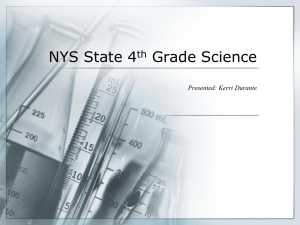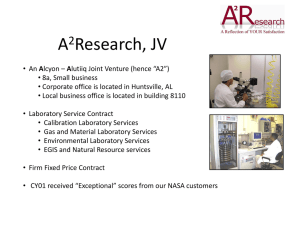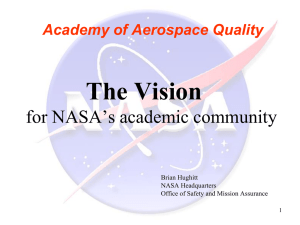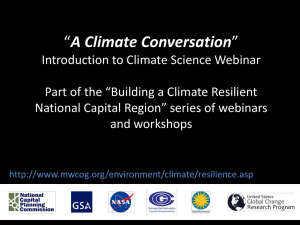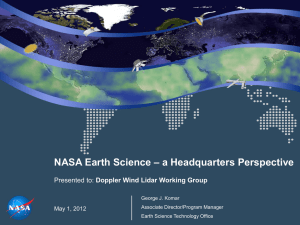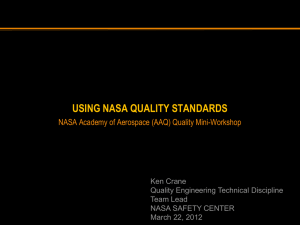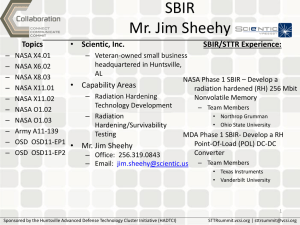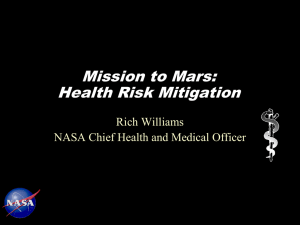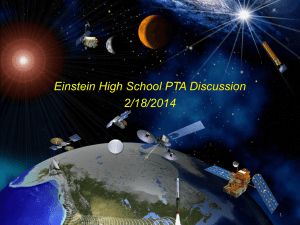NASA Applied Sciences Program and air quality activities
advertisement
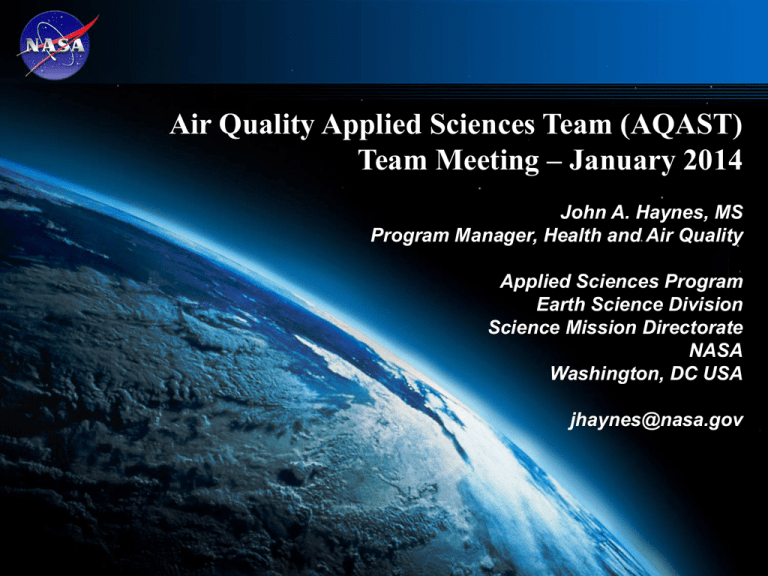
Air Quality Applied Sciences Team (AQAST) Team Meeting – January 2014 John A. Haynes, MS Program Manager, Health and Air Quality Applied Sciences Program Earth Science Division Science Mission Directorate NASA Washington, DC USA jhaynes@nasa.gov 1 Major News Items in the ESD/ASP • 2012 NASA Applied Sciences Annual Report released • New Health and Air Quality solicitation issued on December 23, 2013 (ROSES 13, Element A.44). – – – – – NOIs due on February 27, 2014 Proposals due on April 24, 2014 POP = 3 years Budget: $2.75M; 6-7 awards expected http://nspires.nasaprs.com/external/ • NASA Health/AQ Sessions at the following conferences: – – – – – – – NCAR Workshop on Climate and Health (July 2013) GEO Health Community of Practice Workshop (July 2013) ISPRS/MEDGEO Conference (August 2013) Health and Air Quality Applications Team Meeting (Sept. 2013) Louisiana Air and Waste Management Assoc. Fall Meeting (Oct. 2013) GPM Applications Workshop (Nov. 2013) SMAP Health Applications Workshop (Jan. 2014) NASA Earth Science Division FY14 President’s Budget ($ millions) FY12: $1,760.5 FY13: ~$1,700.0 FY14: $1,846.1 FY15: $1,854.6* FY16: $1,848.9* FY17: $1,836.9* FY18: $1,838.1* * FY15-18 budgets are considered “notional.” Major Items: • • • • President’s Budget requests $35.0M for ASP in FY14 rising to $40.1M in FY18 The FY14 budget for Earth Science is consistent with the FY12 and FY13 request – this represents continued stability, which is a strong endorsement of NASA in a time of fiscal austerity. Additional scope added to ESD (land imaging, climate sensors) with some additional funding. One time $50M FY14 infusion to accelerate Venture Class. Current FY14 Budget Status • CR until January 15 (possible short term extension) • FY14 Omnibus Bill appropriates $5.15B for SMD ($150M more than President’s request) with little other guidance to the divisions. • NASA must provide an Operations Plan to Congress in 30 days. Communications – July 2013 NASA Press Release on SEAC4RS, “NASA SEAC4RS Mission Targets How Pollution, Storms And Climate Mix.” “NASA's DC-8 and ER-2 science aircraft will take to the skies over the southern United States this summer to investigate how air pollution and natural emissions, which are pushed high into the atmosphere by large storms, affect atmospheric composition and climate…” Campaign begins August 7 from Houston's Ellington Field (operated by JSC). |5 Communications – August 2013 August 15: NASA Press Release on DISCOVER-AQ: “NASA Aircraft Take to Skies over Houston for Air Pollution Study” “The P-3B turboprop and two-engine B200 King Air plane are part of a five-year study NASA calls DISCOVER-AQ, which is short for Deriving Information on Surface conditions from Column and Vertically Resolved Observations Relevant to Air Quality.” “Researchers are working to improve the ability of satellites to consistently observe air quality in the lowest part of the atmosphere. If scientists can better observe pollution from space, they may be able to make better air quality forecasts and more accurately determine where pollution is coming from and why emissions vary.” August 16: NASA Press Release on SEAC4RS, “NASA Invites Media to Preview Pollution-Climate Science Flights” “NASA has changed the day for a behind-the-scenes look at the agency's airborne campaign to study how storm systems combine with air pollution from wildfires and other sources to affect our climate. NASA now will host its pollution-climate science flights media day from 1-3 p.m. CDT on Thursday, Aug. 22, in Houston.” |6 Communications – Dec. 2013 A NASA Air Quality Applied Sciences Team (AQAST) project recently published a study in the journal Environmental Science & Technology showing a dramatic increase in India's sulfur dioxide emissions from satellite observations. The analysis of data captured by Aura/OMI found that emissions of sulfur dioxide from Indian power plants have increased by more than 60 percent between 2005 and 2012. http://www.nasa.gov/content/goddard/nasa-satellite-sees-increaseof-indias-sulfur-dioxide-emissions/#.UrNM9LY_6k0 7 Upcoming Events • February 2-6, 2014 – AMS Annual Meeting in Atlanta, GA • February 12-13, 2014 – Orbiting Carbon Observatory 2 Applications Workshop in College Park, MD • May 21, 2014 – American Thoracic Society Annual Meeting in San Diego, CA |8 For More Information… http://appliedsciences.nasa.gov http://weather.msfc.nasa.gov/conference/phconference_sp_home.html
